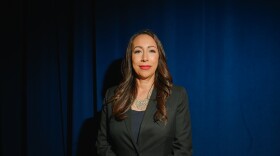California is in the midst of a destructive wildfire season. The Defensible Space Assistance Program helps low-income seniors and physically disabled persons follow defensible space rules.
Sheryl Landrum is the Vice President of the Fire Safe Council of San Diego County. That group works with the Resource Conservation District of Greater San Diego County to offer the program.
“A lot of these people have been in their home for years, they have maybe lost a spouse. They need help,” Landrum said.
RELATED: Pace Of California Wildfires Well Ahead Of Disastrous 2020
Landrum said funding is currently provided by a grant, so the work is done free for the resident.
“California is really focused on wildfire prevention and there are a lot of funds coming down from the Governor’s office right now to do this type of work,” Landrum said. “San Diego River Conservancy was one of the agencies that were funded to help protect the San Diego area from wildfire.”
Landrum knows how important this program is to the community.
“Neighborhoods that do their defensible space have a much, much better chance of surviving a wildfire than those that don’t,” Landrum noted.
RELATED: San Diego County Agencies Ready To Fight Wildfires
The services this program provides would normally cost a property owner thousands of dollars.
If the homeowner does not comply with CAL FIRE’s request to clear an area for defensible space, it could be a costly mistake. The first infraction is a fine no less than $100. A second infraction within five years is a fine of at least $250. A third infraction could result in a misdemeanor charge and a fine no less than $500.
“What can happen is if they’ve been cited for not having their defensible space, and it’s not corrected within a period of time, they can receive another citation,” Landrum said.
Dustin Pope, president of Pope Tree Service performs the defensible space services.
“A lot of people are elderly that we serve and they can’t get out and weed whack four acres or remove dead trees and being so expensive and they're on a limited budget, so it’s an extreme help to them,” Pope said.
He described what his team clears out of a property after a site has been approved for the program: “Dead brush, dead trees, limbs that are hanging low to the ground, we’re clearing up the limbs about six to eight feet and then we’re also weed whacking to create that void between the tree and the ground."
RELATED: Governor Asks Californians To Voluntarily Cut Water Use
Pope said he was contacted just last week by a woman whose property his company had cleared. He said she told him her home near Barona was saved, while both of her neighbor’s properties burned down.
When the services are complete, the chipping can be used as a weed suppressing mulch.
Pope described how you can prepare your home with defensible space.
“House in the middle, take a hundred feet in a circle around your house as much as you can and eliminate all the dead brush, raise up your trees,” Pope said. “Keep your driveways clear so in case a fire truck needs to come in.”
Pope said the easiest way to protect your home is with maintenance.
“Keeping the brush and the weeds down, weed whack as much as you can is the biggest form of fire saving right there,” Pope said.
There is also a No-Cost Chipping program for any resident who clears their own defensible space. After piles are made, contractors will come out and chip the cleared vegetation for free.







